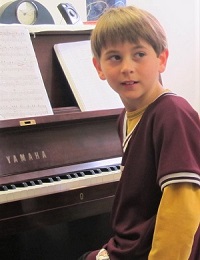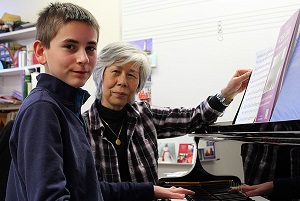In January 2016, we wrote an Opus article featuring a 12-year-old CCM student, Joachim Laurent. We learned about his music theory studies and participation in the Royal Conservatory Music Program, a rigorous assessment program, his commitment to practicing an hour each day. At that point, Joachim had already been learning music and studying the piano with his instructor, Chieko Loy, for six years.
a rigorous assessment program, his commitment to practicing an hour each day. At that point, Joachim had already been learning music and studying the piano with his instructor, Chieko Loy, for six years.
Joachim is now a senior at Concord Carlisle High School, and this fall, he will be attending the University of Chicago. As a student studying at CCM for twelve years, we wondered what he would tell his younger 12-year-old self-featured in the 2016 article.
To My Twelve-Year-Old Self,
Stick with it. The privilege of learning music is one of the greatest gifts a kid can receive. In the next several years, piano will play a vital role in your life. It will be an outlet for your creativity, a test of your patience and intellect, and a means of emotional expression. Through it all, learning the piano will remind you of how far you’ve come and how far you have to go.
You’re probably taking those Royal Conservatory exams about now, and while they might be scary and stressful, what you’re going to learn from them is invaluable—got stage fright? Shaky fingers, sweaty palms? Yeah, I’ve been there. Keep taking every opportunity to perform, and that feeling will all but go away. The technical skills you’ll learn will do wonders when pieces get more complicated, and, as for the theory, I know it can be tedious, but it’s going to help you break down new music and learn it faster and more efficiently.
Oh, and recitals–keep doing them! You’re going to start getting busy with Royal Conservatory, schoolwork, and other competitions, but be sure to make time to show your fellow students what you’ve been working on–the applause is pretty great, too.
As you get older, your academic workload will increase, and your sports schedule will become more intense. Combined with additional extracurricular obligations, finding the time to practice piano may become difficult. It’s here that effective time management and efficiency come into play, and trust me, you’ll be better for it. But if you’re ever feeling too overwhelmed and can’t find the time, don’t sweat it–it’s not the end of the world, and believe me, you should always prioritize a good night’s sleep.
And another important thing–play what you like. While you must expose yourself to the motoric rhythms* of Bach and the classical elegance of Mozart, don’t be afraid to explore a wide variety of music genres–I have a feeling that you’ll develop a particular taste for Chopin. In general, learning music and the piano is a way to push yourself, but it should remain, first and foremost, something you enjoy. If you ever truly find what you’re doing isn’t working, try something new, shake it up, and rediscover that spark. 
And don’t forget Chieko! She’s been with you on this journey for over a decade now and is the best teacher you could ask for. From time to time, make sure you tell her how much you appreciate her, and remember to thank her after every lesson!
Sincerely,
Your Future Self
*Motoric Rhythm, in music, is a 20th-century term for rhythm-based on one specific note value (quavers, for example), usually to sustain or generate energy. Ostinatos (repeating melodic or rhythmic figures) often form motoric rhythms, as in Russian American composer Igor Stravinsky’s The Rite of Spring (1913).
Opus, January 2016 article
Back To Top